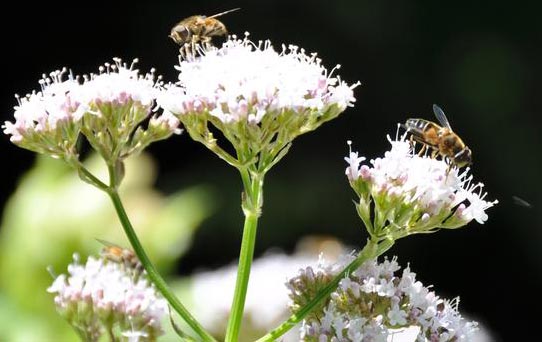Artificial Light Affects Plant Pollination Even During the Daytime

Artificial light at night also adversely affects insects’ pollination behavior during the daytime.
UZH/Agroscope
Streetlights alter the number of flower visits by insects not just at night, but also during the daytime. Artificial light at night thus indirectly affects the entire plant-pollinator community, with unknown consequences for functioning of the ecosystem, as researchers from the University of Zurich and Agroscope have proven for the first time.
The use of artificial light at night around the world has increased enormously in recent years, causing adverse effects on the survival and reproduction of nocturnal organisms. Artificial light at night interferes with vital ecological processes such as the nighttime pollination of plants by nocturnal insects, which could have consequences for agricultural crop yields and reproduction of wild plants.
Scientists from the University of Zurich and Agroscope have now demonstrated for the first time that artificial light at night also adversely affects insects’ pollination behavior during the daytime. In an experiment, they used commercial streetlamps to illuminate natural plant-pollinator communities during the nighttime on six natural meadows. Six other natural meadows were left dark. The research team concentrated its analysis on 21 naturally occurring plant species and the insect orders Diptera, Hymenoptera and Coleoptera.
Differing interactions depending on plant species
“Our findings indicate that artificial light during the nighttime alters the number of plant-pollinator interactions during the daytime, depending on the plant species,” says Eva Knop from UZH’s University Research Priority Program Global Change and Biodiversity and Agroscope. For example, three plant species received significantly fewer, and one other species slightly fewer, pollinator visits during the daytime. A different plant species, in contrast, received many more pollinator visits, and one other a little more, under LED illumination.
Interestingly, nocturnal pollinator activity also varied in the presence of artificial light. For example, woodland geraniums (Geranium sylvaticum) in illuminated and dark meadows received the same number of pollinator visits, but not by the same insects: whereas dipterous insects reduced their visits to plants that were illuminated during the night, beetles (Coleoptera) tended to increase their visits. Two other plant species exhibited similar trends.
Indirect ecological effects of light pollution
The indirect ecological impact of light pollution has been ignored thus far. “Since insects play a vital role in pollinating crops and wild plants and are already endangered by habitat destruction and climate change regardless of artificial light, it is important to study and clarify these indirect mechanisms,” Knop says.
On the basis of their findings, Knop and her colleagues call for “the ecological impact of light pollution to be researched more thoroughly and for actions to be devised to avert adverse effects on the environment.” They say they see ways to do this even though artificial light is an integral feature of populated areas. Public lighting, for instance, could be carefully designed in combination with new technologies to reduce it to a minimum
Wissenschaftliche Ansprechpartner:
Contact:
PD Dr. Eva Knop
Agroscope/URPP Global Change and Biodiversity
Reckenholzstr. 191
Phone +41 58 481 09 86
E-mail: eva.knop@ieu.uzh.ch
Originalpublikation:
Literature:
Giavi S., Fontaine C., Knop E. (2021) Impact of artificial light at night on diurnal plant-pollinator interactions. Nature Communications, 16 March 2021, doi: 10.1038/s41467-021-22011-8
Weitere Informationen:
https://www.media.uzh.ch/de/medienmitteilungen/2021/Nachtbestaeuber.html
Media Contact
All latest news from the category: Agricultural and Forestry Science
Newest articles

Pinpointing hydrogen isotopes in titanium hydride nanofilms
Although it is the smallest and lightest atom, hydrogen can have a big impact by infiltrating other materials and affecting their properties, such as superconductivity and metal-insulator-transitions. Now, researchers from…

A new way of entangling light and sound
For a wide variety of emerging quantum technologies, such as secure quantum communications and quantum computing, quantum entanglement is a prerequisite. Scientists at the Max-Planck-Institute for the Science of Light…

Telescope for NASA’s Roman Mission complete, delivered to Goddard
NASA’s Nancy Grace Roman Space Telescope is one giant step closer to unlocking the mysteries of the universe. The mission has now received its final major delivery: the Optical Telescope…



